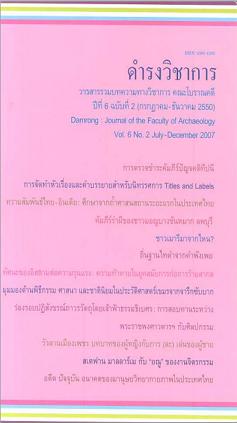"THE LMPRESSONISTS AND EDOUARD MANET" : STEPHANA MALLARME" AND "ATOMS" OF PAINTING
Keywords:
จิตรกรรม, ศิลปะตะวันตก, สเตฟาน มอลลาร์เมAbstract
This article discusses Stephana Mallarme's idea or "theory" of painting from the essay "The Impressionists and Edouard Mane!''. Beside Mallerme's poetic enterprise, his writings on literature are considered seminal in terms of literary ideas and theory throughout the twentieth century. They have been examined widely and critically leading to a set of literary theories. In contrast, his writings on the visual arts are considered marginal, thus few are critically examined. In the context of nineteenth-century literary life, art criticism was considered significant to most authors and poets. For Mallarme, this is not the case. The article "The Impressionists and Edouard Mane!" was narrowly published. It has never been critically examined, unlike his writings on literature. In the oretical terms, Mallarme's ideas of painting have been considered to be part of the formalist theory of art, not dissimilar to its later exponents such as Clive Bell and Clement Greenberg. This may be a result of his assertions being quoted by later critics and artists. However, this research argues that Mallerme's ideas of painting differ considerably from the formalist views in many aspects, to the point of seeing painting as ontologically different from the way most formalist theorists see it. Mallerme perceives painting as being more than sensory experience as atmosphere, light and color; it goes beyond the perceivable brushstrokes, pictorial structures and pictorial planes. Painting, for Mallarme, belongs to the mystical and extra-sensorial experience of another realm comprised only of invisible minute particles. These particles are constantly in a state of flux and thus inherently unstable. It is not dissimilar to the ancient Greek philosophy of Atomism, which is considered to be at the root of Karl Marx' s idea of the material making of commodity. This research traces this set of ideas in aesthetics as well as in their political implications.
Downloads
Issue
Section
License
บทความนี้เป็นผลงานของข้าพเจ้าแต่เพียงผู้เดียว และ/หรือเป็นผลงานของข้าพเจ้าและผู้ร่วมงาน ตามชื่อที่ระบุในบทความจริง และเป็นผลงานที่มิได้ถูกนำเสนอหรือตีพิมพ์ที่ใดมาก่อน





